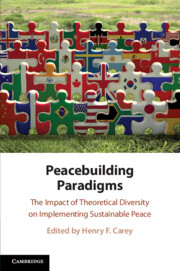Book contents
- Peacebuilding Paradigms
- Peacebuilding Paradigms
- Copyright page
- Contents
- Figures
- Tables
- Contributors
- Foreword
- Introduction Bridging the Conceptual and Theoretical Divides on Peace and Peacebuilding
- Part I The Realist Paradigm
- Part II The Liberal Paradigm
- Part III The Constructivist Paradigm
- Part IV The Cosmopolitan Paradigm
- Part V The Critical Theory Paradigm
- Part VI The Locality Paradigm
- 14 Envisioning PeaceǀTransforming Conflict
- 15 Paradigm Partners for Locally Grounded Peacebuilding
- 16 Cultural Peacebuilding
- Part VII The Policy Paradigm
- Bibliography
- Index
14 - Envisioning PeaceǀTransforming Conflict
A Global Approach to Peace
from Part VI - The Locality Paradigm
Published online by Cambridge University Press: 16 December 2020
- Peacebuilding Paradigms
- Peacebuilding Paradigms
- Copyright page
- Contents
- Figures
- Tables
- Contributors
- Foreword
- Introduction Bridging the Conceptual and Theoretical Divides on Peace and Peacebuilding
- Part I The Realist Paradigm
- Part II The Liberal Paradigm
- Part III The Constructivist Paradigm
- Part IV The Cosmopolitan Paradigm
- Part V The Critical Theory Paradigm
- Part VI The Locality Paradigm
- 14 Envisioning PeaceǀTransforming Conflict
- 15 Paradigm Partners for Locally Grounded Peacebuilding
- 16 Cultural Peacebuilding
- Part VII The Policy Paradigm
- Bibliography
- Index
Summary
This essay develops a conceptual frame for the analysis of peace under a comparative area perspective.I discussthe main concepts (peace, violence, conflict) and assess them in relation to four main theoretical schools (realism, liberalism, cosmopolitanism, critical), demonstrating in the process how a global approach to peace resolves many of the difficulties these theoretical schools encounter by placing specific emphasis on the need to focus a lens on both international and national dynamics across cases. I also address the problem of reliable comparable date and suggest that a comparative area studies approach may be preferable as a means to measure the potential for and progress toward peace.I provide evidence for the added value of such a perspective based on an analysis of peace in Latin America. The concluding section discusses the necessity of a hybrid outlook on peace, which requires sustained action on the part of international and local actors toward reducing conditions of structural violence, and it formulates some avenues for future research.
Keywords
- Type
- Chapter
- Information
- Peacebuilding ParadigmsThe Impact of Theoretical Diversity on Implementing Sustainable Peace, pp. 241 - 254Publisher: Cambridge University PressPrint publication year: 2020

